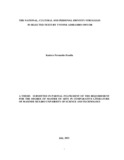| dc.description.abstract | This study analyses the representations of identity struggles in three texts by Owuor Yvonne Adhiambo: the short stories “Weight of Whispers” and “The Knife Grinders Tale” and the novel Dust. The selected texts are studied to determine the extent to which they project the challenges, struggles and the length characters go to in their quest to understand and (re)create their identity. The study looks at how Owuor, through her three texts’ themes, character and characterization therein, brings to the fore the national, cultural and personal struggles the characters go through in an attempt to define who they are. This study comes at a time when most Africans are conflicting with who they truly are while at the same time faced with a myriad of problems; at personal, cultural and national levels. The research further explores how the three texts capture the relationships between space-places and identity creation and struggles; and finally the artistic strategies the author employs to depict her concerns with identity struggles effectively. Using the postcolonial theoretical ideas, which are augmented by the post-structural theoretical thinking, the research explores how the author through her texts highlights the characters’ day-to-day experiences in the places they occupy in relation to the multi-layered identity struggles. Intertextuality, which is the argument that texts elaborate other texts with which they engage in various forms of dialogue, is employed in making a comparative analysis of the three primary texts; it also acts as a lens in the discovery of the various levels of meanings intertwined in the texts. This study argues that identity, as a thematic concern, is an attempt to make sense of oneself in relation to one’s world and because of this, meanings of the basic terms that describe identity are key as a starting point in the process of self-awareness. Owuor’s texts, in the contemporary East African region, are an interaction of discourses and can therefore be looked at as an interlocutor in the ongoing debates about the meaning of individual, cultural and national identities. To this end, this study finds Owuor’s characters as being conscious of their positions in the places and spaces they find themselves in. | en_US |

